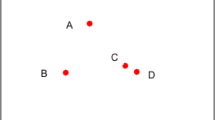Abstract
This paper derives an algorithm for multi-sensor asynchronous track-to-track fusion that combines tracks provided by different sensors, which have each communication delay. In this algorithm, an adaptive approach for fusion in a multi-sensors environment is used. The measurements of two sensors tracking the same target are processed by linear Kalman Filters, and the outputs of the local trackers are sent to the central node. In this node, a decision logic, which is based on the comparison between distance metrics and thresholds, selects the method to obtain the global estimate. The simulation result illustrates that this algorithms approaches the Weighted Covariance Fusion (WCF) algorithm in the fusion precision, and the computational burden reduces one about the half.
Preview
Unable to display preview. Download preview PDF.
Similar content being viewed by others
References
He, Y., Xiu, J.: Radar Data Processing with Applications. Publishing House of Electronics Industry, Peking (2006)
Drummond, O.E.: Feedback in Track Fusion without Process Noise. In: Proc. SPIE Conf. Signal Data Process, Small Targets, vol. 2561, pp. 147–152 (1995)
Alouani, A.T., Rice, T.R.: Asynchronous Track Fusion Revisited. IEEE Transactions on Aerospace and Electronic Systems 1021, 118–122 (2005)
Malmberg, A., Karlsson, M.: Track-to-Track Association in Decentralized Tracking System with Feedback. In: Proc. SpIe Conf. Signal Data Process, Small Targets, vol. 4048, pp. 461–472 (2000)
Singer, R.A.: Estimating Optimal Tracking Filter Performance for Manned Maneuvering Targets. IEEE Transactions on Aerospace and Electronic Systems 72, 473–483 (1970)
Bar-Shalom, Y.: On the Track-to-Track Correlation Problem. IEEE Transactions on Automatic Control 26, 571–572 (1981)
Yang, W.: Multisensor Data Fusion with Application. Xidian University Press, Xi’an (2004)
Author information
Authors and Affiliations
Editor information
Editors and Affiliations
Rights and permissions
Copyright information
© 2009 Springer-Verlag Berlin Heidelberg
About this paper
Cite this paper
Cheng, C., Wang, J. (2009). Algorithm for Multi-sensor Asynchronous Track-to-Track Fusion. In: Yu, W., He, H., Zhang, N. (eds) Advances in Neural Networks – ISNN 2009. ISNN 2009. Lecture Notes in Computer Science, vol 5553. Springer, Berlin, Heidelberg. https://doi.org/10.1007/978-3-642-01513-7_92
Download citation
DOI: https://doi.org/10.1007/978-3-642-01513-7_92
Publisher Name: Springer, Berlin, Heidelberg
Print ISBN: 978-3-642-01512-0
Online ISBN: 978-3-642-01513-7
eBook Packages: Computer ScienceComputer Science (R0)




